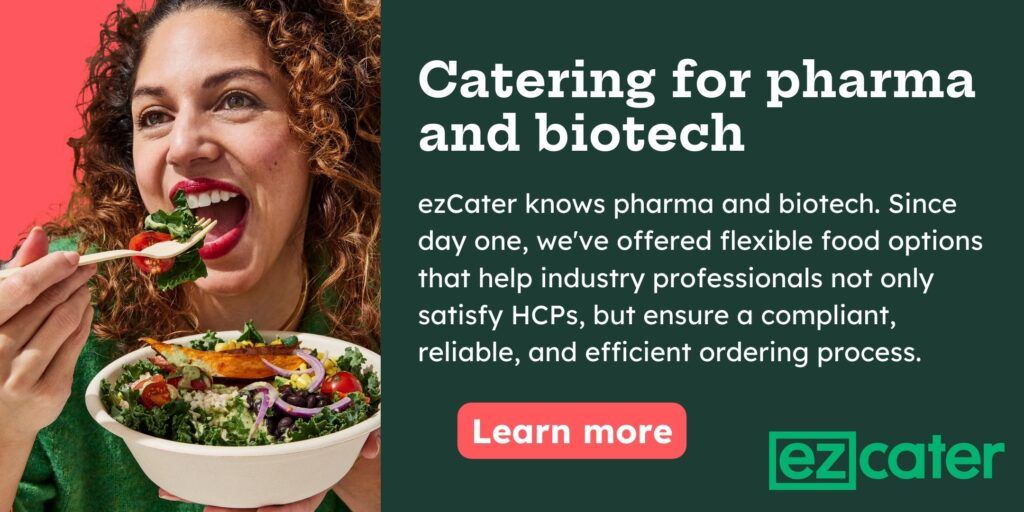Food spending and the sunshine act: easy compliance with ezCater
- Grace Trumpfeller
- •
- 4 Min Read
- •
Everyone likes a free meal, and healthcare professionals are no exception. Pharmaceutical sales professionals know it — which is why they regularly use food as a calling card. In 2022 alone, sales reps treated practitioners to a free lunch nearly one million times.
Sitting down to share a meal isn’t just good for hungry doctors and nurses who struggle to make time for themselves during the day. It’s good for patients, too. Between sips and bites, pharma reps can share information about new products that could drastically improve people’s lives.
But those free meals come with rules and regulations attached. According to the Sunshine Act, pharmaceutical companies and medical device manufacturers must report their total food spend in detail yearly. If they don’t, they face harsh penalties — including steep fines in the millions.
Fortunately, complying with the Sunshine Act isn’t as intimidating as it may seem. Let’s dig into what the legislation covers, who it applies to, and how you can streamline company food spend while following the law.

What is the Sunshine Act?
The Physicians Payments Sunshine Act (PPSA) was officially enacted in 2013 as part of the Affordable Care Act (ACA). It has one simple and laudable goal: increase transparency in the healthcare sector. To achieve it, the Sunshine Act requires medical product manufacturers — including biologics, drugs, medical devices, and medical supplies manufacturers — to report all payments or transfers of value to physicians, teaching hospitals, and other covered recipients.
So, if you work for a pharmaceutical or group purchasing organization operating in the U.S. and have at least one product reimbursed by Medicare, Medicaid, or the Children’s Health Insurance Program, the Sunshine Act applies to you Beyond food and beverage costs, you must disclose financial transactions like:
- Acquisitions
- Charitable contributions
- Consulting fees
- Debt forgiveness
- Education
- Entertainment
- Gifts
- Grants
- Long-term medical supply or device loans
- Research
- Royalty or licenses
- Space rental or facility fees
- Travel and lodging costs
To remain compliant with the Sunshine Act, you must track transactions made to covered recipients between January 1 and December 31 each year, and then report values of $10 or more ($100 annually) to the Centers for Medicare & Medicaid Services (CMS). Annual Sunshine Act reporting takes place through the CMS Open Payments database from February 1 to March 31 of the following calendar year.
Failure to file an accurate, complete, or timely report is subject to a civil monetary penalty between $1,000 and $10,000 for each excluded or delayed payment or transaction. If you knowingly fail to report applicable transactions, the penalty increases to between $10,000 and $100,000 each.
The Sunshine Act, food, and you
Food and beverages accounted for 91% of the total number of payments made to physicians in 2021, so it’s no surprise that CMS mandates proper tracking and reporting for these costs. While only expenses above $10 (or $100 cumulatively for the year) are included in federal Sunshine Act reporting, certain states impose even stricter local guidelines for healthcare food spend:
- In Minnesota, there’s a $50 annual limit on meals per practitioner.
- In Vermont, there’s a total ban on food for healthcare providers who regularly practice in the state.
- In Washington, D.C., there’s a $25 per physician “de minimus” threshold for reporting.
Meals and snacks provided to most nurses and office staff aren’t attributed to physicians and are not reportable under the Sunshine Act, but may be required under state law. So, for the pharma reps who interact with healthcare personnel over a snack, meal, or drink — and for the leaders who train them — understanding the best practices for sending food and reporting funds is essential.

What food spend do pharma companies have to report? 6 examples
No matter where you’re located in the country, you’ve likely found yourself feeding healthcare personnel as part of a lunch, conference, or one-on-one meeting. Here’s a look at how to handle Sunshine Act reporting requirements across common scenarios.
1. Lunch and learn with a small group of physicians and nurses
Let’s say you treated five doctors to a sit-down meal at a local restaurant. As a direct food and beverage expense, you’re required to report the name, address, National Provider Identifier, and state professional license number(s) of each doctor with their individual meal cost as listed on the bill.
If you host a catered lunch and learn with five nurse practitioners onsite instead, divide the price of the spread by the number of attendees who ate. So, if you catered a sandwich platter that cost $100 and all five ate, report it as $20 per person. If only four of the nurses ate, report it as $25 per person.
2. One-on-one meal with a nurse practitioner
Imagine you decided to treat just one doctor to an offsite meal at a local restaurant. No matter if you or the doctor chose the restaurant, you must report the total cost of their food and beverages as shown on the receipt through the CMS Open Payments database.
3. Quick coffee with one doctor
No time for a sit-down meal? No problem! There’s no need to report a quick coffee with a doctor if it’s under the $10 reporting threshold — unless you make it a monthly habit and spend above $100 in the year.
But what if you treat the doctor to a fancy latte and breakfast pastry, too? If the one-time total is above the $10 Sunshine Act meal limit, you’ll need to report the transaction to CMS.
4. Cookies for the office and front-desk staff
Of course, it’s not just doctors who deserve a sweet treat. If you cater cookies for a physician’s office and front-desk staff — and the doctors and nurses do not partake — you do not need to disclose this information to the CMS. Food provided to office staff is not reportable under the Sunshine Act.
However, remember that certain states enforce their own reporting rules for pharmaceutical companies. Vermont’s prescribed product gift bans, for instance, applies to all healthcare service providers — including front-desk staff. Nationwide, the total must be reported if physicians dig into the cookies, too.
5. Fresh fruit basket to a physician’s home after meeting
Picture having a fantastic conversation with a physician, then sending them a fresh fruit basket as a thank you for their time. Even if the basket was addressed to the physician’s immediate family members — like “The Johnson Family” — you must report the transaction through the Open Payments database.
6. Catered lunch spread at a conference
Aside from these individual transactions, you may find yourself catering a group spread at a medical conference. No matter if you cater grab-and-go lunches or a tray-style buffet, you are not required to track or report meals, snacks, or beverages for participants at large-scale conferences and events under the Sunshine Act.
How ezCater simplifies PPSA compliance
Between juggling individual state requirements and keeping track of food receipts for an entire year, remaining compliant with the Sunshine Act is no easy task. Not to mention the challenge of being specific with each individual report, like who ate what and how much was spent per physician.
Skipping annual Sunshine Act reporting is not an option, and neither is guessing physician names and numbers. Physicians themselves have a 45-day period to review and submit corrections before the data is made public, so you can’t just make up figures and hope for the best.
Fortunately, you can breeze through Sunshine Act tracking and Open Payments reports with ezCater.
Go digital with your food receipts
Say goodbye to stacks of hundreds of paper receipts. Once an order is complete, ezCater automatically uploads each receipt to the dashboard for ultimate reporting accuracy. Hands-off management of food receipts is just one of the reasons why ordering with ezCater is so rewarding.
Easily keep track of all your team’s spending
Speaking of hands-off management, you can automatically track your food spend with ezCater’s custom fields. Enter details like region, representative, hospital group, network, or physician to effortlessly sort those expenses later. You can even enforce spending limits on accounts to comply with a company-wide or state-specific Sunshine Act meal limit.
Automated expense reporting
Beyond food spend, you can also automate expense reporting with ezCater. ezCater’s SAP Concur integration instantly sends digital receipts to Concur Expense, so you no longer have to add up yearly expenses manually. Save time, all while enhancing reporting accuracy and peace of mind.
Maintain compliance with minimal effort
The Sunshine Act has demanded that organizations remain transparent about how money is given to physicians, even when it’s through food and beverages. In the decade-plus since PSSA was passed, it’s taken pharmaceutical teams weeks to scour a year’s worth of food receipts and compile the necessary data — but not anymore.
With ezCater’s corporate solutions, you can not only save time and stay compliant while catering food and beverages, but also access thousands of local restaurants and automate everything from delivery to expense reporting. Discover how ezCater can help your organization maximize PPSA compliance today.








